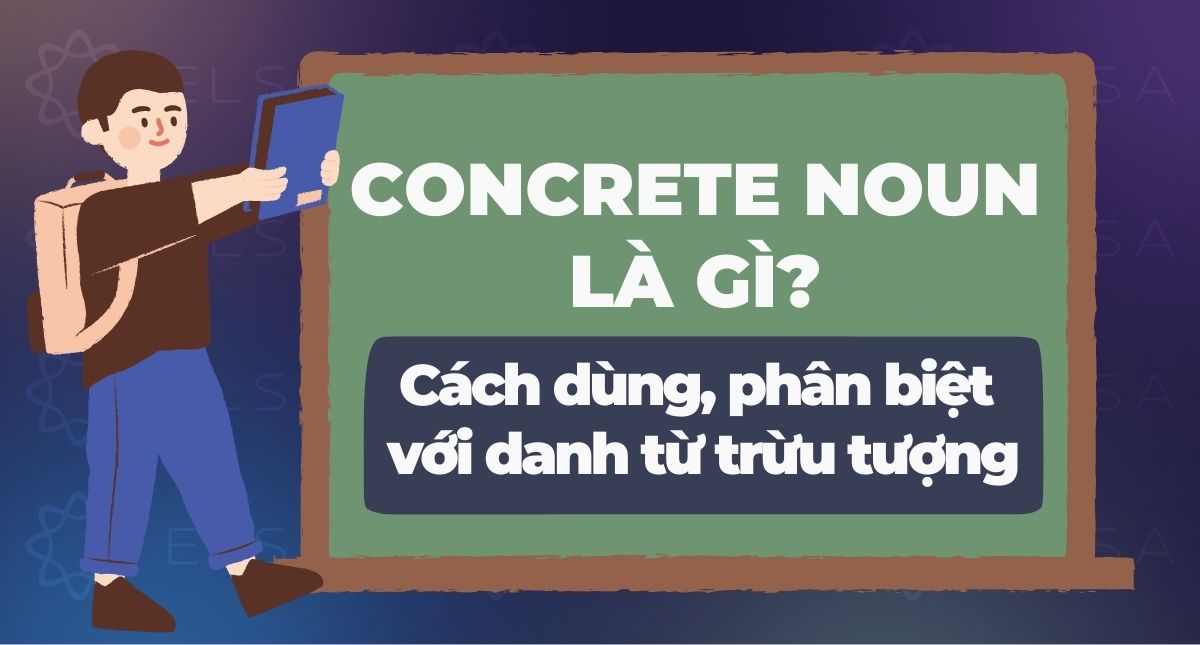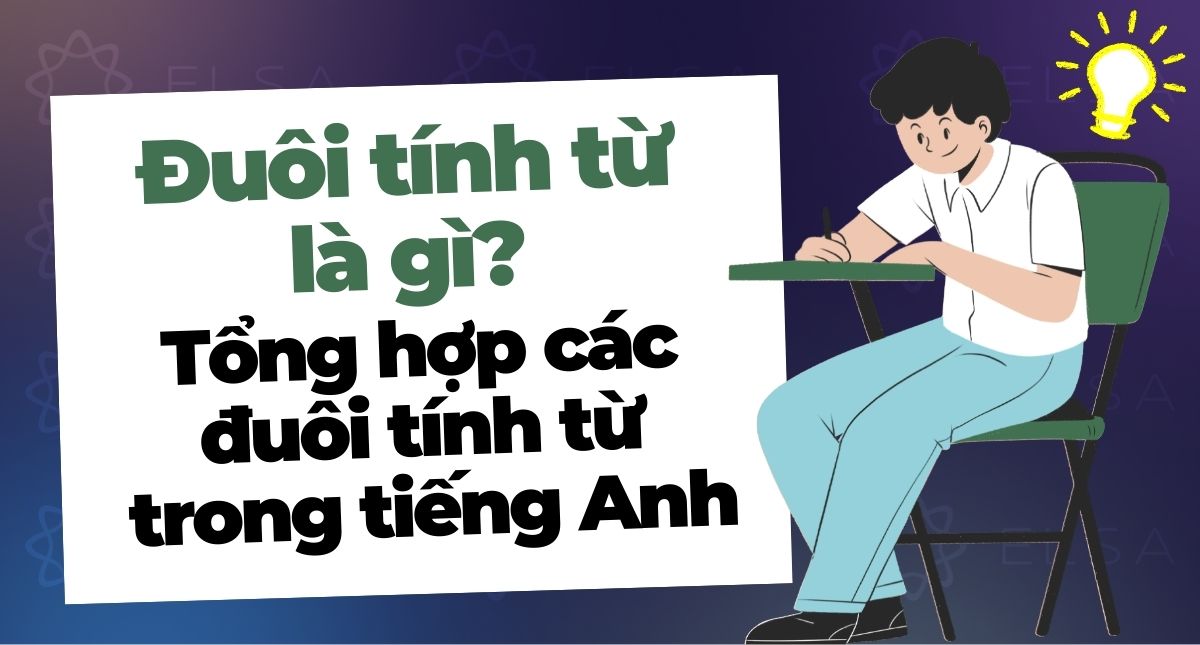Bài tập thì hiện tại đơn là bước không thể thiếu để bạn nắm vững nền tảng ngữ pháp tiếng Anh. Hiểu được điều đó, ELSA Speak đã tổng hợp 100 bài tập đa dạng kèm đáp án chi tiết, giúp bạn ôn luyện hiệu quả nhất. Cùng khám phá ngay để chinh phục điểm ngữ pháp quan trọng này nhé!
Ôn tập lý thuyết thì hiện tại đơn
Thì hiện tại đơn là một trong 12 thì cơ bản trong tiếng Anh và quan trọng nhất trong ngữ pháp tiếng Anh, tạo nền tảng vững chắc cho việc học các cấu trúc phức tạp hơn. Để có thể tự tin thực hành các bài tập thì hiện tại đơn, trước hết bạn cần nắm vững toàn bộ kiến thức lý thuyết về cách dùng, cấu trúc và dấu hiệu nhận biết của thì này.
Kiểm tra phát âm với bài tập sau:

Xem chi tiết lý thuyết: Thì hiện tại đơn (Present simple): Công thức, cách dùng, dấu hiệu nhận biết
Cách dùng thì hiện tại đơn
- Diễn tả một thói quen, một hành động lặp đi lặp lại ở hiện tại
- Ví dụ: My father watches the news every evening. (Bố tôi xem thời sự mỗi tối).
- Diễn tả một sự thật hiển nhiên, một chân lý không thay đổi
- Ví dụ: The Earth moves around the Sun. (Trái Đất quay quanh Mặt Trời).
- Diễn tả một lịch trình, thời gian biểu cố định
- Ví dụ: The first train to Hanoi leaves at 5:30 AM. (Chuyến tàu đầu tiên đến Hà Nội khởi hành lúc 5:30 sáng).
- Diễn tả trạng thái, cảm xúc, suy nghĩ, hoặc sự sở hữu ở hiện tại: Cách dùng này áp dụng với các động từ chỉ trạng thái (stative verbs) như know, believe, understand, love, hate, want, need, seem…
- Ví dụ: She wants a cup of coffee. (Cô ấy muốn một tách cà phê).
- Dùng trong câu điều kiện loại 1
- Ví dụ: If it rains, we will stay at home. (Nếu trời mưa, chúng tôi sẽ ở nhà).
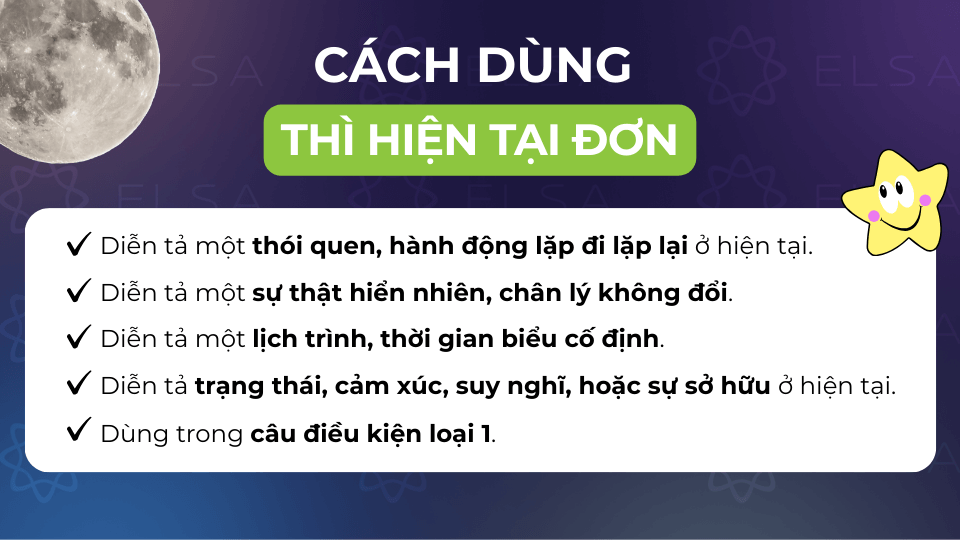
| Việc đọc thêm các nội dung liên quan đến have to và must sẽ giúp bạn nắm rõ sắc thái ý nghĩa của từng cấu trúc và áp dụng hiệu quả hơn khi giao tiếp. |
Cấu trúc thì hiện tại đơn
| Loại động từ | Câu Khẳng định (+) | Câu Phủ định (-) | Câu Nghi vấn (?) |
| Động từ TO BE (am / is / are) | S + am/ is/ are + O/Adj Ví dụ: She is a teacher. | S + am/ is/ are + not + O/Adj Ví dụ: They are not tired. | Am / Is / Are + S + O/Adj? Ví dụ: Are you hungry? |
| Động từ THƯỜNG (V) | S + V(s/es) + (O) Ví dụ: He reads books every day. | S + do/ does + not + V-inf + (O) Ví dụ: I do not play games. | Do / Does + S + V-inf + (O)? Ví dụ: Does she live here? |
Dấu hiệu nhận biết thì hiện tại đơn
- Các trạng từ chỉ tần suất (Adverbs of Frequency):
- Always (luôn luôn)
- Usually, Frequently (thường xuyên)
- Often (thường)
- Sometimes (thỉnh thoảng)
- Occasionally (thỉnh thoảng)
- Seldom, Rarely (hiếm khi)
- Never (không bao giờ)
- Các cụm từ chỉ sự lặp lại:
- Every day/ week/ month/ year… (mỗi ngày/ tuần/ tháng/ năm…)
- Once/ twice/ three times… a day/ week/ month… (một lần/ hai lần/ ba lần… một ngày/ tuần/ tháng…)
- On Mondays/ Tuesdays… (vào các ngày thứ Hai/ thứ Ba…)
| Có thể bạn quan tâm: Phát âm CH chi tiết và chuẩn chỉnh như người bản ngữ Thì hiện tại tiếp diễn (Present Continuous): Công thức, cách dùng Trọn bộ 100 bài tập câu bị động có đáp án chi tiết Word Form là gì? Quy tắc, công thức và bài tập áp dụng |

Có thể bạn quan tâm:
- Dấu hiệu nhận biết thì hiện tại hoàn thành
- Go out là gì? Định nghĩa, cách dùng, mẫu câu và bài tập
- Dấu hiệu nhận biết thì quá khứ đơn
- Trọn bộ bài tập thì quá khứ đơn
- Sau tính từ sở hữu là gì? Cách dùng và bài tập
Lưu ý khi làm bài tập chia động từ thì hiện tại đơn
Quy tắc thêm đuôi “s” và “es” vào động từ
Khi chủ ngữ là he/she /it, động từ đổi theo quy tắc sau:
- Thêm “s”: work → works, read → reads
- Thêm “es” nếu tận cùng là s, sh, ch, x, z: watch → watches, fix → fixes
- Động từ kết thúc bằng phụ âm + y → bỏ y, thêm ies: study → studies, cry → cries
- Động từ bất quy tắc: go → goes, do → does, have → has
Cách phát âm đuôi “s” và “es”
Đuôi “s/es” có 3 cách phát âm tùy âm cuối của từ:
- /s/ → sau âm vô thanh (/p/, /t/, /k/, /f/, /θ/), ví dụ: books, cats, works,…
- /iz/ → sau âm s, z, sh, ch, x, ge, ví dụ: buses, matches, judges,…
- /z/ → các trường hợp còn lại, ví dụ: plays, goes, lives
Xem chi tiết lý thuyết:
Cách thêm s, es vào danh từ và động từ trong tiếng Anh
Bài tập phát âm s es ed và nhấn trọng âm (Trắc nghiệm kèm đáp án chi tiết)
Cách nhấn trọng âm tiếng Anh đơn giản, dễ nhớ, có bài tập
💡 Mẹo luyện phát âm: Mở ngay app ELSA Speak và thử nói các từ như cats, matches, goes. Ứng dụng sẽ chấm điểm phát âm từng âm /s/, /z/, /iz/ và hướng dẫn bạn chỉnh khẩu hình chi tiết — giúp bạn nói tiếng Anh chuẩn và tự tin hơn mỗi ngày!
Tổng hợp bài tập thì hiện tại đơn thường gặp [có đáp án chi tiết]
Để củng cố vững chắc phần lý thuyết vừa học, hãy cùng ELSA Speak thực hành ngay với các dạng bài tập thì hiện tại đơn thường gặp dưới đây. Mỗi bài tập đều có đáp án và giải thích cặn kẽ để bạn hiểu sâu hơn về kiến thức.
Bài tập chia động từ trong ngoặc với thì hiện tại đơn
Bài tập 1: Chia động từ trong ngoặc theo thì hiện tại đơn.
- She (read) books every night.
- We (go) to school by bike.
- My brother (watch) TV after dinner.
- I (like) ice cream.
- They (play) football on Sundays.
- She (study) English every day.
- He (have) breakfast at 7 a.m.
- You (work) hard.
- It (rain) a lot in summer.
- The dog (bark) at strangers.
Đáp án:
| Câu – Đáp án | Giải thích |
| 1. She reads books every night. (Cô ấy đọc sách mỗi tối.) | ‘She’ là ngôi thứ ba số ít → thêm -s vào động từ. |
| 2. We go to school by bike. (Chúng tôi đi học bằng xe đạp.) | ‘We’ là số nhiều → giữ nguyên động từ. |
| 3. My brother watches TV after dinner. (Anh tôi xem TV sau bữa tối.) | Động từ tận cùng là -ch → thêm -es. |
| 4. I like ice cream. (Tôi thích kem.) | ‘I’ → giữ nguyên động từ. |
| 5. They play football on Sundays. (Họ chơi bóng đá vào Chủ nhật.) | ‘They’ là số nhiều → giữ nguyên động từ. |
| 6. She studies English every day. (Cô ấy học tiếng Anh mỗi ngày.) | Động từ tận cùng phụ âm + y → đổi y → i + es. |
| 7. He has breakfast at 7 a.m. (Anh ấy ăn sáng lúc 7 giờ sáng.) | ‘have’ là bất quy tắc → đổi thành has. |
| 8. You work hard. (Bạn làm việc chăm chỉ.) | ‘You’ → giữ nguyên động từ. |
| 9. It rains a lot in summer. (Trời mưa nhiều vào mùa hè.) | ‘It’ là ngôi thứ ba số ít → thêm -s. |
| 10. The dog barks at strangers. (Con chó sủa người lạ.) | Danh từ số ít → động từ thêm -s. |
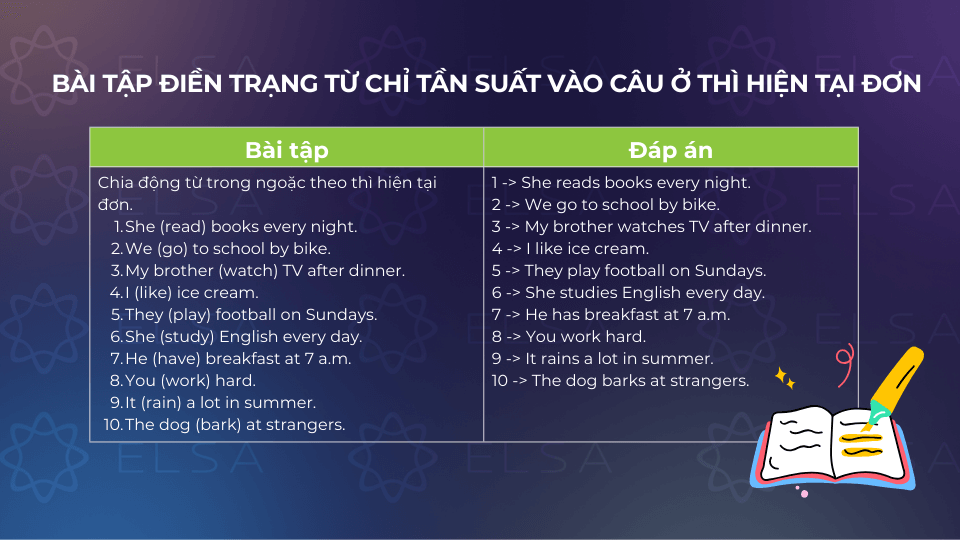
>> Xem thêm: Go off là gì? Cách sử dụng go off trong tiếng Anh
Bài tập điền trạng từ chỉ tần suất vào câu ở thì hiện tại đơn
Bài tập 2: Điền các trạng từ chỉ tần suất sau vào vị trí đúng trong câu: always, usually, often, sometimes, never.
- I __________ eat vegetables.
- She is late for class. (__________)
- We __________ watch TV after dinner.
- My parents __________ go to the cinema.
- Tom __________ brushes his teeth before bed.
- They __________ play soccer on Sundays.
- The bus is __________ on time.
- I am __________ tired in the morning.
- You __________ forget your homework.
- He __________ drinks coffee in the evening.
- My sister __________ listens to music while studying.
- Jane is __________ polite to everyone.
- The teacher __________ gives us homework.
- I __________ help my mom with housework.
- He is __________ busy at work.
Đáp án:
| Câu – Đáp án | Giải thích |
| 1. I sometimes eat vegetables. (Tôi thỉnh thoảng ăn rau.) | Trạng từ chỉ tần suất đặt trước động từ thường. |
| 2. She is never late for class. (Cô ấy không bao giờ trễ học.) | Trạng từ đặt sau động từ to be. |
| 3. We often watch TV after dinner. (Chúng tôi thường xem TV sau bữa tối.) | Trạng từ đứng trước động từ thường. |
| 4. My parents rarely go to the cinema. (Bố mẹ tôi hiếm khi đi xem phim.) | Trạng từ chỉ tần suất trước động từ thường. |
| 5. Tom always brushes his teeth before bed. (Tom luôn đánh răng trước khi ngủ.) | Trạng từ chỉ thói quen → đứng trước động từ thường. |
| 6. They usually play soccer on Sundays. (Họ thường chơi bóng đá vào Chủ nhật.) | ‘usually’ đứng trước động từ thường. |
| 7. The bus is always on time. (Xe buýt luôn đúng giờ.) | Sau động từ to be → trạng từ đặt sau ‘is’. |
| 8. I am sometimes tired in the morning. (Tôi đôi khi mệt vào buổi sáng.) | Trạng từ sau ‘am’ (to be). |
| 9. You often forget your homework. (Bạn thường quên bài tập về nhà.) | Trước động từ thường. |
| 10. He never drinks coffee in the evening. (Anh ấy không bao giờ uống cà phê buổi tối.) | Trước động từ thường. |
| 11. My sister usually listens to music while studying. (Chị tôi thường nghe nhạc khi học.) | Trước động từ thường. |
| 12. Jane is always polite to everyone. (Jane luôn lịch sự với mọi người.) | Trạng từ sau động từ to be. |
| 13. The teacher often gives us homework. (Cô giáo thường cho bài tập.) | Trạng từ trước động từ thường. |
| 14. I always help my mom with housework. (Tôi luôn giúp mẹ làm việc nhà.) | Trạng từ chỉ thói quen → đứng trước động từ. |
| 15. He is rarely busy at work. (Anh ấy hiếm khi bận rộn khi làm việc.) | Trạng từ chỉ tần suất đặt sau ‘is’. |
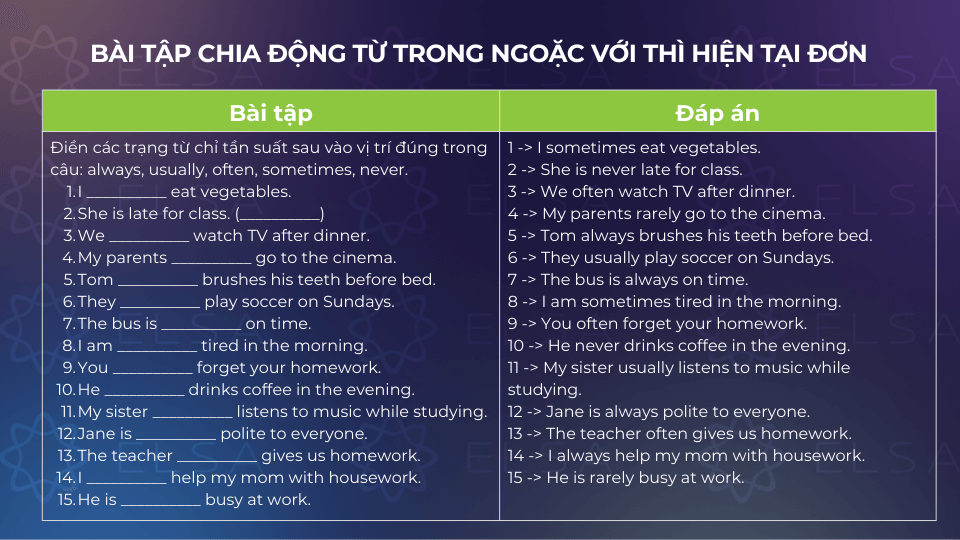
| Có thể bạn quan tâm: Trật tự tính từ trong tiếng Anh (OSASCOMP): Quy tắt và cách nhớ Công thức câu bị động: Cách dùng và bài tập Tổng hợp câu bị động hiện tại tiếp diễn (Present Continuous Passive): Công thức và Bài tập vận dụng |
Bài tập thì hiện tại đơn tìm và sửa lỗi sai cơ bản
Bài tập 3: Mỗi câu dưới đây có một lỗi sai liên quan đến thì hiện tại đơn. Hãy xác định và sửa lại cho đúng.
- He go to school every morning.
- I plays badminton after class.
- My mother cook dinner at 6 p.m.
- They goes shopping on weekends.
- The dog bark loudly at night.
- She don’t like cold weather.
- We watches movies on Fridays.
- John and Mary walks to the park.
- It don’t rain much in summer.
- You works in a hospital.
Đáp án:
| Câu – Đáp án | Giải thích |
| 1. He goes to school every morning. (Anh ấy đi học mỗi sáng.) | ‘He’ là ngôi thứ ba số ít → động từ thêm -es. |
| 2. I play badminton after class. (Tôi chơi cầu lông sau giờ học.) | ‘I’ không thêm -s → dùng động từ nguyên thể. |
| 3. My mother cooks dinner at 6 p.m. (Mẹ tôi nấu bữa tối lúc 6 giờ.) | ‘My mother’ là số ít → thêm -s vào động từ. |
| 4. They go shopping on weekends. (Họ đi mua sắm cuối tuần.) | ‘They’ là số nhiều → không thêm -es. |
| 5. The dog barks loudly at night. (Con chó sủa to vào ban đêm.) | ‘The dog’ là số ít → động từ thêm -s. |
| 6. She doesn’t like cold weather. (Cô ấy không thích thời tiết lạnh.) | Phủ định với ‘She’ → dùng doesn’t + V nguyên thể. |
| 7. We watch movies on Fridays. (Chúng tôi xem phim vào thứ Sáu.) | ‘We’ là số nhiều → không thêm -es. |
| 8. John and Mary walk to the park. (John và Mary đi bộ đến công viên.) | Danh từ kép → số nhiều → không thêm -s. |
| 9. It doesn’t rain much in summer. (Trời không mưa nhiều vào mùa hè.) | Ngôi thứ ba số ít → phủ định dùng doesn’t + V nguyên thể. |
| 10. You work in a hospital. (Bạn làm việc ở bệnh viện.) | ‘You’ → không thêm -s vào động từ. |
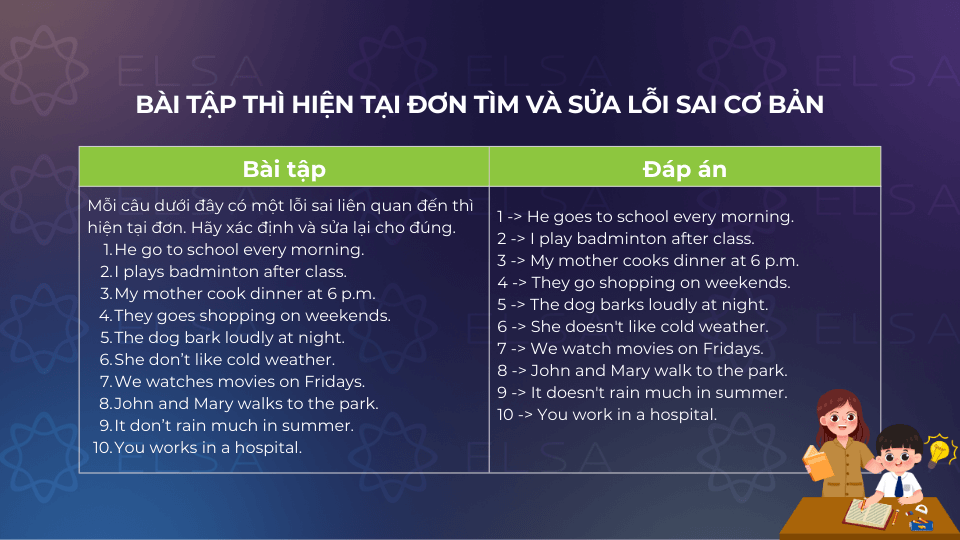
| Có vẻ bạn đang tìm kiếm dạng bài trắc nghiệm? Yên tâm nhé, ELSA Speak đã chuẩn bị 1 bộ bài tập trắc nghiệm thì hiện tại đơn rồi. Mời bạn thử sức ngay nhé! |
Bài tập viết lại câu ở thì hiện tại đơn sử dụng từ cho sẵn
Bài tập 4: Viết lại câu hoàn chỉnh ở thì hiện tại đơn, sử dụng từ gợi ý đã cho. Bạn cần chia động từ và sắp xếp đúng trật tự câu.
- (She / go / to school / every day)
- (They / not / like / cold weather)
- (I / play / football / on Sundays)
- (My father / watch / TV / every night)
- (He / not / eat / vegetables)
- (We / study / English / at school)
- (It / rain / a lot / in October)
- (You / be / always / late)
- (Nam and Lan / walk / to school)
- (The cat / sleep / on the sofa)
Đáp án:
| Câu – Đáp án | Giải thích |
| 1. She goes to school every day. (Cô ấy đi học mỗi ngày.) | ‘She’ → ngôi thứ ba số ít → thêm -es vào động từ ‘go’. |
| 2. They do not like cold weather. (Họ không thích thời tiết lạnh.) | ‘They’ → dùng do not + V nguyên thể. |
| 3. I play football on Sundays. (Tôi chơi bóng đá vào Chủ nhật.) | ‘I’ → động từ giữ nguyên. |
| 4. My father watches TV every night. (Bố tôi xem TV mỗi tối.) | ‘My father’ là ngôi thứ ba số ít → thêm -es vào ‘watch’. |
| 5. He does not eat vegetables. (Anh ấy không ăn rau.) | Phủ định ngôi thứ ba số ít → dùng does not + V nguyên thể. |
| 6. We study English at school. (Chúng tôi học tiếng Anh ở trường.) | ‘We’ → động từ giữ nguyên. |
| 7. It rains a lot in October. (Trời mưa nhiều vào tháng Mười.) | ‘It’ → ngôi thứ ba số ít → thêm -s. |
| 8. You are always late. (Bạn luôn luôn đến trễ.) | Với động từ to be, không chia như động từ thường. |
| 9. Nam and Lan walk to school. (Nam và Lan đi bộ đến trường.) | Danh từ kép → số nhiều → giữ nguyên động từ. |
| 10. The cat sleeps on the sofa. (Con mèo ngủ trên ghế sofa.) | ‘The cat’ là số ít → động từ thêm -s. |
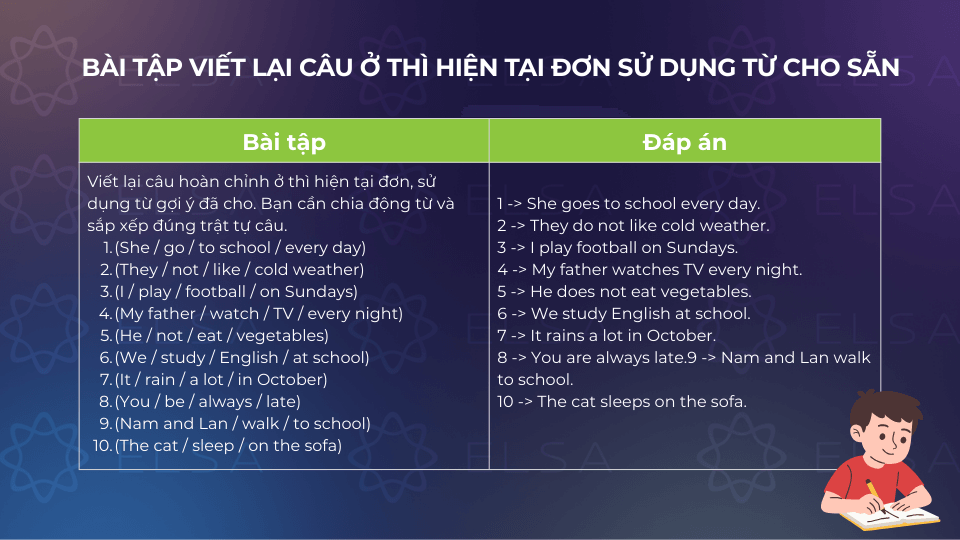
>> Xem thêm:
- On the other hand là gì? Cấu trúc và cách dùng tự nhiên nhất
- Coming soon là gì? Cách dùng chi tiết và bài tập
- Ngữ pháp sở hữu cách là gì? Cách sử dụng đầy đủ nhất
Bài tập điền dạng phủ định ở thì hiện tại đơn
Đề bài 5: Viết lại các câu sau ở dạng phủ định thì hiện tại đơn.
- She plays the piano.
- I go to school on Sundays.
- They have lunch at 12 o’clock.
- He watches TV every night.
- We study French.
- It rains in the summer.
- My brother eats vegetables.
- You work on weekends.
- The dog barks at night.
- Tom drinks coffee in the morning.
Đáp án:
| Câu – Đáp án | Giải thích |
| 1. She does not play the piano. (Cô ấy không chơi đàn piano.) | Phủ định với ngôi thứ ba số ít → does not + V nguyên thể. |
| 2. I do not go to school on Sundays. (Tôi không đi học vào Chủ nhật.) | ‘I’ dùng do not + V nguyên thể. |
| 3. They do not have lunch at 12 o’clock. (Họ không ăn trưa lúc 12 giờ.) | ‘They’ là số nhiều → dùng do not. |
| 4. He does not watch TV every night. (Anh ấy không xem TV mỗi tối.) | ‘He’ là ngôi thứ ba số ít → dùng does not + watch (không thêm -es). |
| 5. We do not study French. (Chúng tôi không học tiếng Pháp.) | ‘We’ là số nhiều → dùng do not. |
| 6. It does not rain in the summer. (Trời không mưa vào mùa hè.) | ‘It’ là ngôi thứ ba số ít → dùng does not + V nguyên thể. |
| 7. My brother does not eat vegetables. (Anh tôi không ăn rau.) | ‘My brother’ là số ít → dùng does not + eat. |
| 8. You do not work on weekends. (Bạn không làm việc cuối tuần.) | ‘You’ → dùng do not + work. |
| 9. The dog does not bark at night. (Con chó không sủa vào ban đêm.) | Danh từ số ít → dùng does not + V nguyên thể. |
| 10. Tom does not drink coffee in the morning. (Tom không uống cà phê vào buổi sáng.) | Tên riêng số ít → dùng does not + drink. |
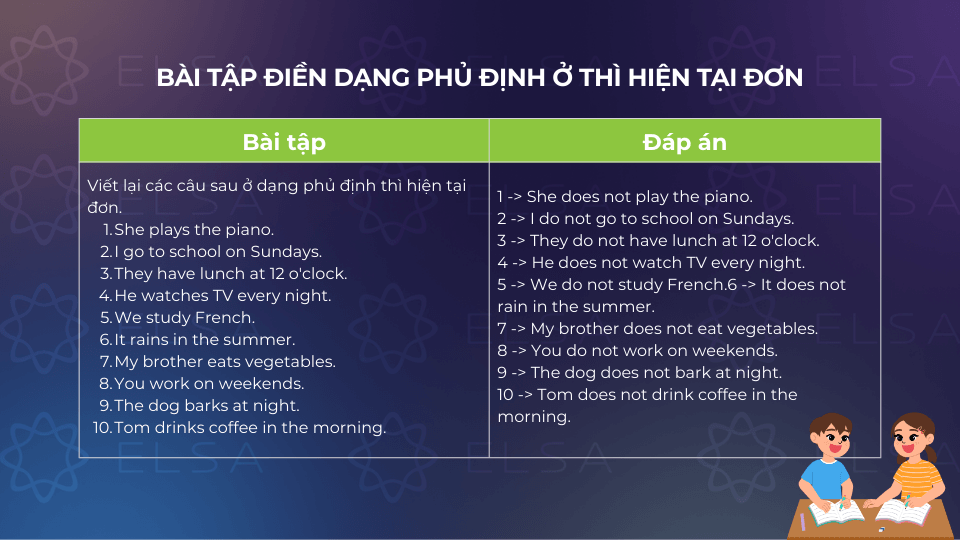
| Có thể bạn quan tâm: Cách viết lại câu thì hiện tại hoàn thành kèm bài tập có đáp án 100 bài tập câu bị động thì hiện tại đơn từ đơn giản đến phức tạp Cách phân biệt danh từ đếm được và không đếm được dễ nhất |
Bài tập hoàn thành các câu hỏi với thì hiện tại đơn
Bài tập 6: Hoàn thành các câu hỏi sau ở thì hiện tại đơn, sử dụng từ gợi ý trong ngoặc. Chú ý chia động từ và đặt đúng trật tự câu hỏi.
- (he / like / coffee)
- (you / go / to school / every day)
- (they / play / football / on weekends)
- (she / watch / TV / in the evening)
- (your father / read / newspaper)
- (Tom and Lan / live / near here)
- (it / rain / in March)
- (the students / have / homework)
- (you / be / tired)
- (Nam / speak / English)
Đáp án:
| Câu – Đáp án | Giải thích |
| 1. Does he like coffee? (Anh ấy có thích cà phê không?) | Ngôi thứ ba số ít → dùng Does + chủ ngữ + V nguyên thể. |
| 2. Do you go to school every day? (Bạn đi học mỗi ngày phải không?) | ‘You’ → dùng Do ở đầu câu. |
| 3. Do they play football on weekends? (Họ chơi bóng đá vào cuối tuần phải không?) | ‘They’ → số nhiều → dùng Do. |
| 4. Does she watch TV in the evening? (Cô ấy có xem TV vào buổi tối không?) | ‘She’ là ngôi thứ ba số ít → dùng Does. |
| 5. Does your father read the newspaper? (Bố bạn có đọc báo không?) | ‘Your father’ là số ít → dùng Does + read. |
| 6. Do Tom and Lan live near here? (Tom và Lan sống gần đây phải không?) | Hai chủ ngữ → số nhiều → dùng Do. |
| 7. Does it rain in March? (Trời có mưa vào tháng Ba không?) | ‘It’ là ngôi thứ ba số ít → dùng Does + rain. |
| 8. Do the students have homework? (Các học sinh có bài tập về nhà không?) | ‘The students’ là số nhiều → dùng Do. |
| 9. Are you tired? (Bạn có mệt không?) | Câu hỏi với to be → dùng Are + chủ ngữ. |
| 10. Does Nam speak English? (Nam có nói tiếng Anh không?) | ‘Nam’ là tên riêng số ít → dùng Does + speak. |
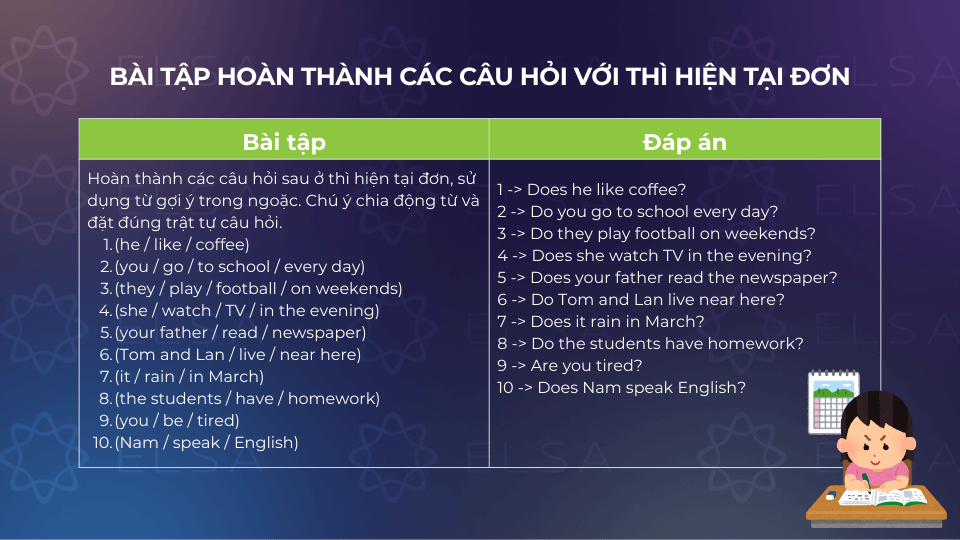
| Có thể bạn quan tâm: Các dạng bài tập hiện tại đơn và hiện tại tiếp diễn (có đáp án) |
Bài tập viết lại câu sang dạng bị động thì hiện tại đơn
Bài tập 7: Viết lại các câu sau ở dạng bị động thì hiện tại đơn.
- He cleans the room every day.
- They water the flowers in the morning.
- She writes many letters.
- Tom opens the shop at 7 a.m.
- We watch that TV program every week.
- People use English all over the world.
- They sell books in this store.
- The chef cooks delicious food.
- The teacher corrects our homework.
- My mother washes the clothes.
Đáp án:
| Câu – Đáp án | Giải thích |
| 1. The room is cleaned every day. (Căn phòng được dọn dẹp mỗi ngày.) | Bị động: be + V3/ed, chủ ngữ bị động là “the room”. |
| 2. The flowers are watered in the morning. (Những bông hoa được tưới vào buổi sáng.) | “The flowers” là số nhiều → dùng are. |
| 3. Many letters are written. (Nhiều lá thư được viết.) | Động từ “write” → V3 là “written”. |
| 4. The shop is opened at 7 a.m. (Cửa hàng được mở lúc 7 giờ sáng.) | “The shop” là số ít → dùng is. |
| 5. That TV program is watched every week. (Chương trình TV đó được xem mỗi tuần.) | “That TV program” là số ít → dùng is watched. |
| 6. English is used all over the world. (Tiếng Anh được sử dụng trên khắp thế giới.) | Danh từ không đếm được → dùng is used. |
| 7. Books are sold in this store. (Sách được bán ở cửa hàng này.) | “Books” là số nhiều → dùng are sold. |
| 8. Delicious food is cooked by the chef. (Món ăn ngon được nấu bởi đầu bếp.) | Thêm “by the chef” để giữ nghĩa người thực hiện. |
| 9. Our homework is corrected by the teacher. (Bài tập về nhà của chúng tôi được sửa bởi giáo viên.) | “Our homework” là số ít → dùng is corrected. |
| 10. The clothes are washed by my mother. (Quần áo được giặt bởi mẹ tôi.) | “The clothes” là số nhiều → dùng are washed. |
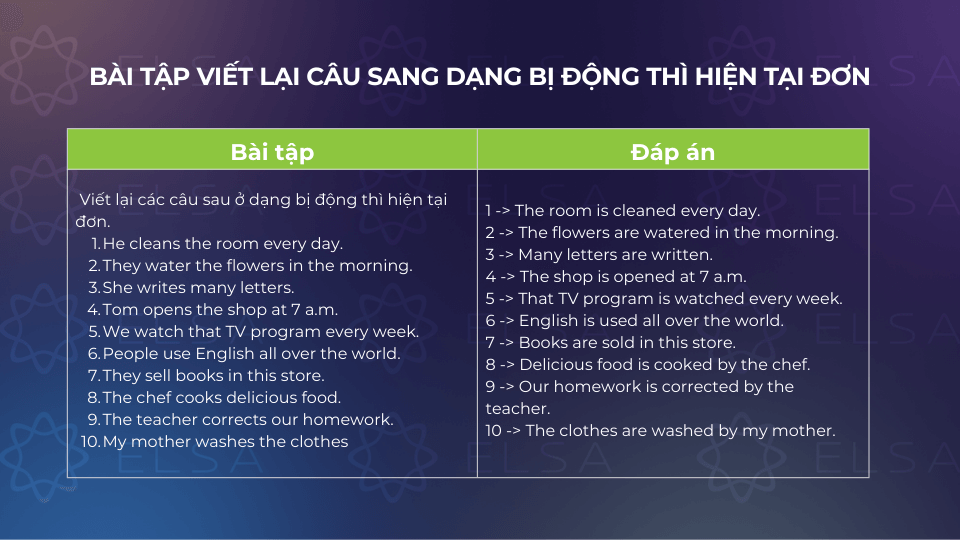
Bài tập thì hiện tại đơn nâng cao
Bài tập 8: Chia đúng dạng thì hiện tại đơn của động từ trong ngoặc.
- My brother ___ (study) French and Spanish at school.
- What time ___ the train usually ___ (arrive)?
- She ___ (not like) cold weather, but she ___ (love) snow.
- Mr. Long always ___ (go) jogging before breakfast.
- Why ___ he always ___ (forget) his homework?
- ___ your sister ___ (enjoy) reading novels?
- Look! That parrot ___ (talk) again! No, parrots ___ (not talk), they just repeat.
- ___ your friends often ___ (play) online games after school?
- The moon ___ (go) around the Earth.
- She ___ (go) to school every day.
Đáp án:
| Câu – Đáp án | Giải thích |
| 1. My brother studies French and Spanish at school. (Anh tôi học tiếng Pháp và tiếng Tây Ban Nha ở trường.) | ‘My brother’ là ngôi thứ ba số ít → thêm -es vào động từ kết thúc bằng “-y” sau phụ âm. |
| 2. What time does the train usually arrive? (Tàu thường đến lúc mấy giờ?) | Câu hỏi với ngôi thứ ba số ít → dùng does, động từ chính để nguyên mẫu. |
| 3. She doesn’t like cold weather, but she loves snow. (Cô ấy không thích thời tiết lạnh, nhưng lại yêu tuyết.) | Phủ định với doesn’t + V nguyên mẫu, khẳng định thêm -s vì ngôi thứ ba số ít. |
| 4. Mr. Long always goes jogging before breakfast. (Ông Long luôn đi bộ thể dục trước bữa sáng.) | ‘Mr. Long’ là ngôi thứ ba số ít → thêm -es. |
| 5. Why does he always forget his homework? (Tại sao cậu ấy luôn quên bài tập?) | Câu hỏi với does, động từ sau để nguyên. |
| 6. Does your sister enjoy reading novels? (Chị của bạn có thích đọc tiểu thuyết không?) | Câu hỏi Yes No question → dùng Does + V nguyên mẫu. |
| 7. Look! That parrot talks again! No, parrots don’t talk, they just repeat. (Nhìn kìa! Con vẹt đó lại nói nữa! Không, vẹt không thực sự nói, chúng chỉ lặp lại.) | Dù có “Look!”, câu thứ nhất vẫn là mô tả hành vi lặp lại. Dạng phủ định với don’t talk. |
| 8. Do your friends often play online games after school? (Bạn của bạn thường chơi game sau giờ học phải không?) | ‘Your friends’ là số nhiều → dùng Do. |
| 9. The moon goes around the Earth. (Mặt trăng quay quanh Trái Đất.) | Sự thật hiển nhiên, ngôi thứ ba số ít → thêm -es. |
| 10. She goes to school every day. (Cô ấy đi học mỗi ngày.) | Ngôi thứ ba số ít → thêm -es. |
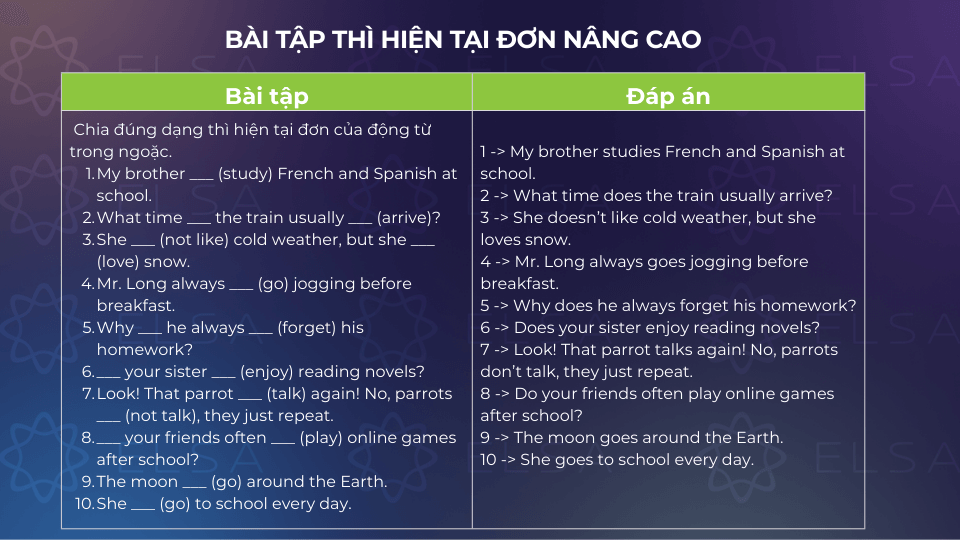
| Chinh phục bài tập các thì cơ bản tiếng Anh tại đây: Bài tập thì hiện tại tiếp diễn (Present Continuous) Bài tập thì hiện tại hoàn thành (Present Perfect) Bài tập thì quá khứ đơn (Past Simple) Bài tập thì tương lai đơn (Future Simple) |
Xem thêm:
- Cấu trúc As Soon As trong tiếng Anh: công thức, cách dùng và bài tập ví dụ
- Giới từ trong tiếng Anh: Cách dùng, phân loại và bài tập minh họa
- Động từ to be là gì? Cách chia to be theo thì kèm bài tập
Hy vọng kho tàng 100 bài tập thì hiện tại đơn trên đây đã giúp bạn tự tin hơn khi sử dụng ngữ pháp. ELSA Speak sẽ luôn đồng hành cùng bạn trên hành trình chinh phục tiếng Anh. Đừng quên theo dõi chuyên mục Ngữ pháp của chúng tôi để cập nhật nhiều bài học bổ ích khác nhé.
 13/11/2025 | kien.le
13/11/2025 | kien.le








